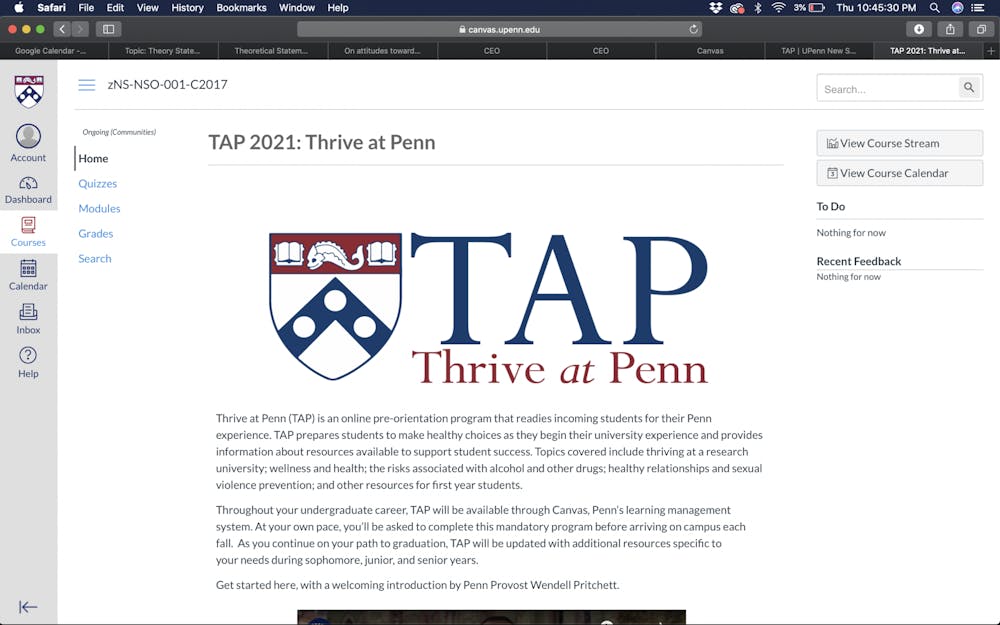
As finals season approaches, students are now involved in a module focused on mental health tips called "Taking Care of Yourself."
An administrator said Penn hopes to expand a new student orientation Canvas course, previously intended for first-generation, low-income freshmen, to all new students at the Board of Trustees committee meeting on academic policy Thursday. Members of the committee, which includes Penn Provost Wendell Pritchett, also demonstrated the procedure to approving a master's degree.
The 168 participants in the fall semester's Pre-Freshman Program — many of whom are first-generation, low-income students — are currently in an optional semester-long Canvas course intended to help students adjust to college life and navigate relationships with professors, Vice Provost for Education Beth Winkelstein said at the meeting. The Canvas course is similar to the Thrive at Penn modules that all freshmen must complete.
Given the success of the program, Winkelstein said Penn hopes to expand the program to all freshmen.
“The hope is, as we keep thinking about how we work on New Student Orientation and [the] transition to college, we can do this for everyone," Winkelstein said.
PFP is a four-week residential program for new freshmen that precedes New Student Orientation. First-generation, low-income students are part of the pool of admitted students selected to participate in PFP. Other students invited to PFP include freshmen underrepresented in their fields of study and students who went to large urban high schools, according to the PFP website.
On the Canvas module, students watch five- to six-minute videos which offer advice from upperclassmen and faculty, Winkelstein said. The videos are designed to “help provide freshmen with a stronger sense ... of belonging, normalize asking for help, and identify support and role models.”
Winkelstein said the students completed three modules during the summer and are in the process of completing another three during the semester. Each module the students complete during the semester is meant to align with what they are currently doing in college. Now, as finals season approaches, the students are seeing a module focused on mental health tips called "Taking Care of Yourself."
Along with watching the videos on Canvas, students take part in frequent journaling activities.
"The journaling is what they like most," Winklestein said.
The creation of the course was a collaborative effort between the Faculty Council on Access and Academic Support, the Center for Teaching and Learning, Penn Online Learning, and the Penn First Plus Office.
Members of the Trustees at the meeting also demonstrated how a master's degree is approved. The Trustees used the "Master of Science program in Educational Technology and Design" as the mock degree receiving approval.
In the exercise, the program was created by GSE Dean Pam Grossman and PennDesign Dean Frederick Steiner and has an "aim of deepening one's expertise in design integration and technology in a learning environment," School of Nursing Associate Dean for Academic Programs Julie Sochalski said.
Sochalski proposed the program as a collaboration between the GSE and PennDesign in the hypothetical exercise. As part of the exercise, Provost Wendell Pritchett suggested that the "Engineering School must be involved in some way" because of the program's focus on innovative technology.
The Board of Trustees full board meetings are scheduled for three times a year. The fall stated meeting involving the entire board takes place Friday while a series of Trustees committee meetings took place Thursday.
Correction: A previous version of article incorrectly mentioned the Trustees committee proposed the Master of Science program. The discussion on the program was a hypothetical exercise. The DP regrets this error.
The Daily Pennsylvanian is an independent, student-run newspaper. Please consider making a donation to support the coverage that shapes the University. Your generosity ensures a future of strong journalism at Penn.
Donate






